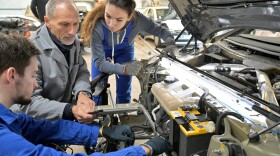Indiana advocates said formerly incarcerated people need mental health and rehabilitation services to help them transition back into society. One group in Marion County is calling on lawmakers and other advocacy groups across the state to increase these resources.
PACE — or Public Advocates in Community re-Entry — helps people reenter society after incarceration. The organization provides a variety of support services targeted to help Hoosiers before and after they are released from incarceration. These programs include Recovery Works, Guidance for Post-Release Support and Breaking the Chains.
Breaking the Chains is a program for men who are at high risk of reoffending. The 10-week program addresses trauma-related issues among participants and fosters rehabilitation. At the end of the program, the participants graduate and receive monthly visits from facilitators until they are released.
Executive Director Rhiannon Edwards said addressing mental health and addiction are some of the biggest challenges formerly incarcerated people go through — but they're rarely talked about.
"They'll get out, and they'll get a job, and then it doesn't work out, or there's a violation, and they're re-incarcerated," Edwards said. "And a lot of that stems from not dealing with kind of those issues that might have led them to get incarcerated to begin with."
READ MORE: One group in northeast Indiana helps reduce recidivism through transportation program
Join the conversation and sign up for the Indiana Two-Way. Text "Indiana" to 765-275-1120. Your comments and questions in response to our weekly text help us find the answers you need on statewide issues.
She said one of the biggest misconceptions is that the only thing formerly incarcerated people need is a job. But Edwards said we also need to address the bad things that happened to them.
"Nobody validates their feelings. We just tell them to come out.
You got a felony. You can't go there. Go get a job. Do this," Edwards said. "We don't— we don't validate their experience at all."
Edwards said she wants Breaking the Chain to go statewide — which she said will take state funding and support from advocacy groups.
Timoria is our labor and employment reporter. Contact her at tcunningham@wfyi.org.
Copyright 2025 IPB News









